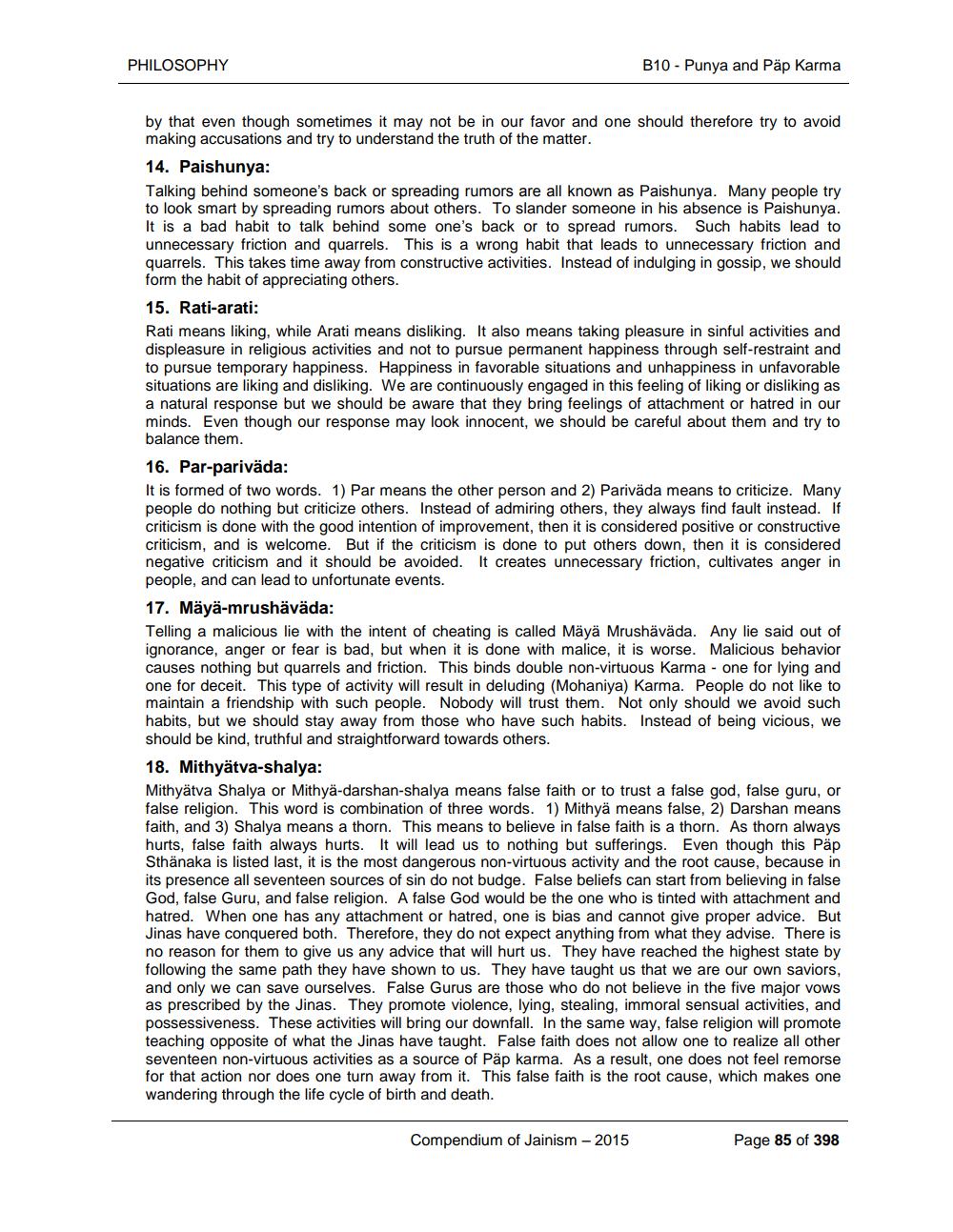________________
PHILOSOPHY
B10 - Punya and Pap Karma
by that even though sometimes it may not be in our favor and one should therefore try to avoid making accusations and try to understand the truth of the matter. 14. Paishunya: Talking behind someone's back or spreading rumors are all known as Paishunya. Many people try to look smart by spreading rumors about others. To slander someone in his absence is Paishunya. It is a bad habit to talk behind some one's back or to spread rumors. Such habits lead to unnecessary friction and quarrels. This is a wrong habit that leads to unnecessary friction and quarrels. This takes time away from constructive activities. Instead of indulging in gossip, we should form the habit of appreciating others. 15. Rati-arati: Rati means liking, while Arati means disliking. It also means taking pleasure in sinful activities and displeasure in religious activities and not to pursue permanent happiness through self-restraint and to pursue temporary happiness. Happiness in favorable situations and unhappiness in unfavorable situations are liking and disliking. We are continuously engaged in this feeling of liking or disliking as a natural response but we should be aware that they bring feelings of attachment or hatred in our minds. Even though our response may look innocent, we should be careful about them and try to balance them.
16. Par-pariväda: It is formed of two words. 1) Par means the other person and 2) Parivada means to criticize. Many people do nothing but criticize others. Instead of admiring others, they always find fault instead. If criticism is done with the good intention of improvement, then it is considered positive or constructive criticism, and is welcome. But if the criticism is done to put others down, then it is considered negative criticism and it should be avoided. It creates unnecessary friction, cultivates anger in people, and can lead to unfortunate events. 17. Mäyä-mrushäväda: Telling a malicious lie with the intent of cheating is called Mäyä Mrushäväda. Any lie said out of ignorance, anger or fear is bad, but when it is done with malice, it is worse. Malicious behavior causes nothing but quarrels and friction. This binds double non-virtuous Karma - one for lying and one for deceit. This type of activity will result in deluding (Mohaniya) Karma. People do not like to maintain a friendship with such people. Nobody will trust them. Not only should we avoid such habits, but we should stay away from those who have such habits. Instead of being vicious, we should be kind, truthful and straightforward towards others. 18. Mithyätva-shalya: Mithyätva Shalya or Mithya-darshan-shalya means false faith or to trust a false god, false guru, or false religion. This word is combination of three words. 1) Mithya means false, 2) Darshan means faith, and 3) Shalya means a thorn. This means to believe in false faith is a thorn. As thorn always hurts, false faith always hurts. It will lead us to nothing but sufferings. Even though this Päp Sthanaka is listed last, it is the most dangerous non-virtuous activity and the root cause, because in its presence all seventeen sources of sin do not budge. False beliefs can start from believing in false God, false Guru, and false religion. A false God would be the one who is tinted with attachment and hatred. When one has any attachment or hatred, one is bias and cannot give proper advice. But Jinas have conquered both. Therefore, they do not expect anything from what they advise. There is no reason for them to give us any advice that will hurt us. They have reached the highest state by following the same path they have shown to us. They have taught us that we are our own saviors, and only we can save ourselves. False Gurus are those who do not believe in the five major vows as prescribed by the Jinas. They promote violence, lying, stealing, immoral sensual activities, and possessiveness. These activities will bring our downfall. In the same way, false religion will promote teaching opposite of what the Jinas have taught. False faith does not allow one to realize all other seventeen non-virtuous activities as a source of Päp karma. As a result, one does not feel remorse for that action nor does one turn away from it. This false faith is the root cause, which makes one wandering through the life cycle of birth and death.
Compendium of Jainism - 2015
Page 85 of 398




